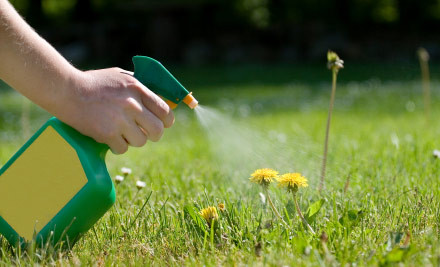The Problem
So you want to kill some weeds, eh? Go into any mainstream lawn and garden center and you’ll find many chemical herbicides for sale, the most common ones contain the active ingredient Glyphosate. They all work pretty much the same way – application of a poison that kills the weeds. But what are the consequences of applying that poison to your lawn?
- There are serious health concerns associated with even just a little exposure (see below). Exposure comes from touching the liquid, from simple inhalation, and from eating foods grown in the soil treated with it (any food not organically grown can fall in this category).
- You are going to inhale and maybe touch the spray when you apply it.
- Your children and pets are going to inhale it and possibly tough it when they are near it or playing in that area. It’s still active for weeks after spraying…
- Wildlife is going to inhale or touch it, too.
- A 2011 study shows that the active ingredient in the popular herbicide “Round-Up” (glyphosate), is readily flowing into the ground water under the areas where it is being applied.
Why This is a Problem
Round-Up/Glyphosate has been linked to many serious long-term health effects such as lymphoma, DNA damage, glyphosate toxicity, hormone disorders in children, low testoterone in men, hairy leukoplakia, lymphoma, oxidative stress, hemolytic anemia, multiple myeloma, rhinitis, Parkinson’s disease, infertility (see footnotes below)…the list goes on. It is a powerful endocrine disruptor (unbalancing hormones). It is genotoxic (damages your genes), neurotoxic (damages your nerves), hepatoxic (impairs your liver), and nephrotoxic (injures your kidneys). There are indications that it may contribute to birth defects and abnormal fetal development. As if this isn’t bad enough, it has also been shown to be carcinogenic (causes cancer).
Safe Weed Killer Solution
Your local organic and biodynamic farmers are a treasure of valuable information for gardening and landscaping in a health-preserving way. When Mr. Mueller and I were first looking into natural weed killers many years ago, it was one our local farmers who gave us the following recipe.
Tips:
1. Don’t spray this mix onto areas where you will want to plant other things. The salt will “kill” the soil (the beneficial organisms) and prevent you from being able to grow most things for quite a while.
2. If you want to use a weed killer on an area where you will later want to grow something, find a source for 35% White Vinegar and spray it straight on the soil from your pump sprayer.
[gn_highlight]NATURAL WEED KILLER RECIPE (makes 3 gallons)
from Frog Holler Organiks
You can use backpack sprayer or Hand-held sprayer for this
1. Pour three 26 oz containers of Morton Salt into a pantyhose (1 knee-hi works fine)
2. Toss filled hose into your backpack sprayer 3. Add 3 gallons white vinegar to your sprayer.
4. Put on your back and shake up and down and sideways a little (helps if you have some good tunes on your IPOD crankin’)
5. Spray weeds in the sunshine with temps 70 and above.
Some stubborn ones may take twice but hey, you just saved your DNA and endocrine system from Round-up so you’ll have more time! AND, you spent a lot less money, and helped drive Monsanto stock down. Don’t you feel good while spraying weeds?!!!!![/gn_highlight]
A Few Studies






Okay — We shall have to figure another solution; but, what if the organic farmer has been doing it for years and he’s still growing great plants?
We all put on EPSOM SALTS to enhance our plants — what’s the difference?
Also, towns spray TONS AND TONS of SALT of the roads during the winters and the plants still grow along the sides of roadways
RESPONSE BY DR. BRUCK, PLANT PATHOLOGIST AND GLOBAL WARMING EXPERT::
PROBLEM WITH THIS SOLUTION
sodium chloride desiccates cell membranes and kills them. Indeed they put salt on the road and when it is sprayed by tires onto the trees- it kills them. Epsom salt is magnesium chloride- totally different
NOT A GOOD IDEA- AT ALL. Salt is persistently stored in the soil as a cation. It will poison the soil where you sprayed for years.
Tremendous things here. I’m very satisfied to see your article.
Thank you a lot.
Greetings from Los angeles! I’m bored to tears at work so I decided to browse your site
on my iphone during lunch break. I love the information you provide
here and can’t wait to take a look when I get home.
I’m amazed at how quick your blog loaded on my cell phone ..
I’m not even using WIFI, just 3G .. Anyways, good blog!
Thank you for sharing this weed killer article. I personally use the natural weed killers to kill the weed in my lawn.
Salt is not a good thing to be applying to soils since it can prevent anything from growing for a long time. Epsom salts is different in this way. There are other options to weed control that I would recommend without needing to use either glyphosate or 2, 4-d (I think 2, 4-d is at least as bad and it is related to Agent Orange). Some other options: proper lawn care and yard care, learn which “weeds” are edible and use them, weed control ideas: https://gardeninspire.com/?s=weed+control